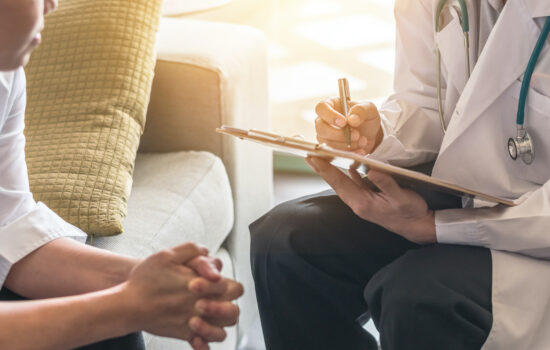November 2, 2020
Cancer Screening During COVID-19

When the Covid-19 pandemic initially hit the U.S., most of the country went into lockdown, and elective medical procedures were temporarily put on hold to reduce the spread of the virus while prioritizing the needs of those who contracted the virus. Unfortunately, that’s led to a decline in the number of people getting the essential, life-saving cancer screenings they need.
At this point, restrictions have eased, many businesses have reopened, and elective procedures are being made available once again. If it’s time for your routine cancer screenings, talk with your doctor to schedule your appointment. And while you need to consider the risk versus the benefits during the ongoing pandemic, it’s important to understand how critical these screenings are – they can save your life!
The Importance of Routine Cancer Screenings
Since the beginning of the Covid-19 pandemic, there have been fewer cancer diagnoses, which researchers believe is likely due to the delayed physician appointments and cancer screenings. Don’t be lulled into a false sense of security because cancer diagnoses have declined. Experts at the National Cancer Institute caution that as a result of the pandemic, those delayed diagnoses could result in thousands of deaths from colorectal and breast cancers in the next decade – a sobering thought.
Many types of cancer don’t present symptoms right away, and cancer screening exams help find cancers in the early stages when you have the greatest chance of treating the disease successfully. Once cancers progress to their later stages, it’s more difficult to treat the disease, increasing the risk of death.
Even if getting a cancer screening hasn’t been at the top of your list right now as you’ve navigated the pandemic, it’s time to start making these exams a priority. Continuing to delay needed screenings can result in missing early-stage cancers, which means they won’t be caught until they’ve become more advanced. Screenings are particularly important for individuals who have a higher risk of developing cancer, such as those who’ve previously had abnormal screenings, individuals with a family history of cancer, or patients with known genetic mutations.
How Often Do You Typically Need Cancer Screenings?
How often do you typically need the most common types of cancer screening exams? We’ve put together a helpful guide, so you know if it’s time to book those screenings now.
- Cervical Cancer Screenings – Starting at age 21, it’s recommended that you have a cervical cancer screening every three years with a Pap test. Over the age of 30, you can move to Pap test screenings every three years or every five years with both a Pap and HPV test. If you’re over the age of 65, no testing is recommended if your results have been normal in the past 10 years.
- Breast Cancer Screenings – Mammograms may be started as early as age 40, depending on your risk factors. Between the ages of 50-54, mammograms are recommended year. After the age of 55, talk to your healthcare provider about whether you need screening every year or every other year.
- Colon Cancer Screenings – Colon cancer testing should begin at the age of 45. After the age of 75, discuss whether you should continue screening exams with your physician. Keep in mind that stool tests can be done safely in your home.
- Prostate Cancer Screenings – At the age of 50, discuss the pros and cons of prostate cancer screenings with your healthcare professional.
- Lung Cancer Screenings – If you’re a former or current smoker that smoked an average of one pack a day for 20 years or more, annual testing via low-dose CT scans is recommended.
These are only a few of the general guidelines for cancer screenings. Always discuss these exams with your personal healthcare provider who knows your health history best and can recommend the right screenings for your unique situation.
Important Safety Tips for Cancer Screenings During Covid-19
While continuing with essential cancer screenings is critical and may save your life, you do want to make sure that screenings are done safely to reduce the risk of contracting Covid-19. Some of the important precautions medical facilities are taking include:
- Screening centers offer the ability to handle questions via website or phone before and after screening exams have been done.
- Appointments are booked in a manner to allow for physical distancing, ensuring there’s no crowding in patient care areas or waiting rooms.
- Centers are disinfecting and cleaning surfaces and equipment regularly. You can ask your screening center how often cleaning and disinfection occurs, so you feel comfortable and safe.
- Prescreening for Covid-related symptoms before appointments should be done to ensure patients who may have the virus do not visit the center.
- Limitations are in place on visitors entering the screening centers.
- Staff and patients all must wear face masks or face coverings.
- Staff, patients, and all visitors should frequently wash hands and use hand sanitizer.
Your local cancer screening centers are taking precautions to keep you safe as the pandemic continues. With proper safety precautions in place, don’t risk your future health by failing to get the screenings you need. If it’s time for a cancer screening exam, book it today. It might save your life.
Categories: Cancer Screening